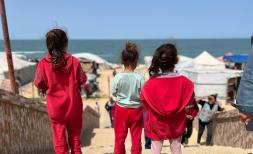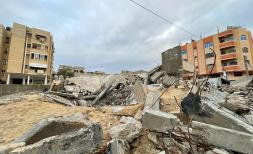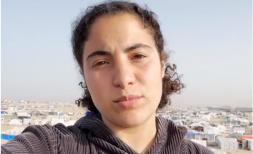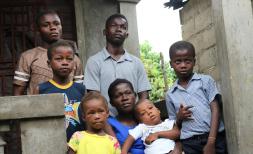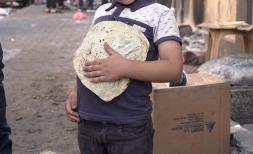Education is the answer
Children have a right to learn and a right to an education that will support their development, growth and ability to build their future. This right does not end in times of an emergency. In fact, it is even more essential that children who have escaped conflict and witnessed atrocities no child ever should, have the safe haven of schools and learning opportunities. A space to be with peers, play, learn, a space where their parents know that they are safe. The impact of this space, and the stability and routine it offers, where children can grow, learn and simply be children cannot be overstated.
Rohingya children have had their lives interrupted, the ground beneath their feet ripped from under them as they fled horrific violence in their home country over two years ago. Education can counter this chaos, providing at least some stable ground where children can plant their feet – ground on which they can begin to recover and rebuild.
This is why the recent announcement from the Bangladeshi government that they will provide Rohingya refugee children with access to expanded education opportunities—including skills training, based on the Myanmar curriculum—is immeasurably important.
Not only is it an essential first step at giving back Rohingya children some of the stability they have lost since being forced to flee to Bangladesh, it also prepares them to reintegrate back into Myanmar society when they are able to return in a safe, voluntary and dignified manner. Education also protects children. It reduces some of the daily risks they face in the refugee camps, including child marriage, child labour, trafficking, exploitation, abuse and neglect.
Children like 14-year-old Tomal* will reap the benefits. He dreams of being a journalist someday, so he can tell the world about his people and their struggles; so he can be their voice. Tomal is so passionate about learning that he’s teaching himself how to be a journalist by reading anything he can get his hands on: posters, newspapers, books and magazines.
For more than two years we have been urging the world to give Rohingya refugee children some hope for the future. For children like Tomal, this new policy represents renewed hope for him to pursue his dream.
Save the Children applauds this decision by the Bangladeshi government. It not only demonstrates their commitment to ensuring that all children have access to a quality, inclusive education, but also the Bangladesh government’s commitment to ensuring Rohingya children’s future.
When we speak to children and families in the camps, they overwhelmingly voice their desire to return home, to work, to go to school, to live safely in Myanmar. However, to do that, they must not be allowed to live in limbo in the camps of Cox’s Bazar without access to their rights, while they wait for conditions to change in Rakhine state so that they can return some day.
Rohingya children must have access to their rights on both sides of the border, they must be equipped now with the tools they will need to support a prosperous and peaceful Rakhine state in the future. With this shift in policy, the Government of Bangladesh has demonstrated its commitment to not only safe, voluntary and dignified return of the Rohingya to Myanmar, but to ensuring that any return is sustainable. With the implementation of this pilot-project, children and youth now have access to an opportunity that will, for the first time in over two years, link them to their home country and enable them to build a better life when they return.
But this is just a first step. There are over 400,000 children in the camps and we must work to provide them with a quality, accredited education. We must also now look to Myanmar to support this move, by giving their full support to the Government of Bangladesh and the humanitarian community as we implement this ambitious new goal to expand education for Rohingya children and youth. The Government of Myanmar should work with Dhaka to support the accreditation of Rohingya children’s education and provide technical guidance and engagement as we start to train teachers in the camp to shift over to the Myanmar curriculum.
It is not enough to just expand access to learning opportunities. For this move to have real impact for children, they must receive an education that is formally accredited. Accrediting Rohingya children’s education is absolutely essential in ensuring they will be able to support themselves, their families and their communities in the future – a future outside of the camps of Cox’s Bazar.
*name changed
